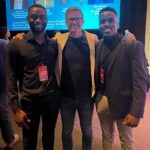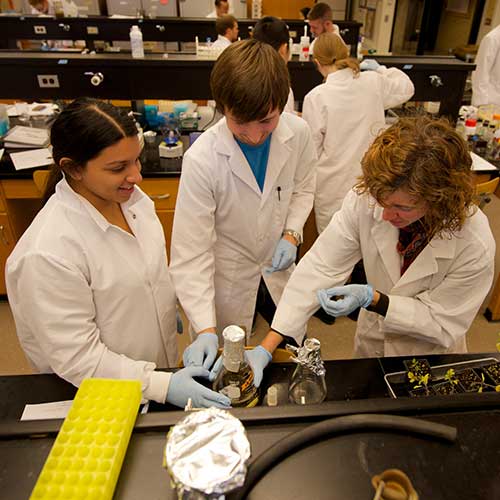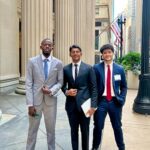
Wooster receives $475 thousand HHMI grant to support inclusive excellence in research mentoring in STEM

The College of Wooster has received a grant of $475,000 from the Howard Hughes Medical Institute Inclusive Excellence 3 (IE3) initiative for work over the next six years on inclusive excellence in research mentoring in the science, technology, engineering, and mathematics fields (STEM). The initiative challenged United States colleges and universities to sustainably build capacity for student belonging, especially for those who have been historically excluded from the sciences. The Institute announced in November that 104 colleges and universities received grants through the IE3 initiative to continue their critical work to build capacity for inclusion of all students in science. These grants—totaling more than $60 million over six years—along with previous funding to IE1 and IE2 schools, are now supporting 161 schools nationwide as they design experiments aimed at improving the introductory undergraduate science experience.
Wooster is part of a Learning Community Cluster collaborating with 14 other institutions of various sizes from around the country including Cleveland State University, Bryn Mawr College in Pennsylvania, University of Mississippi, and Occidental College in Los Angeles, among others. The institutions will collaborate to develop professional development resources and opportunities for faculty and staff that address effective inclusive teaching and evaluate those techniques in the rewards system including faculty promotion and tenure. At Wooster, the grant will support faculty learning communities on inclusive research mentoring.
“Mentored research is a key component of a Wooster education, however many faculty do not receive formal training in the skills of mentoring in general and inclusive mentoring in particular,” said Laura Sirot, professor of biology who served as lead applicant on the grant. “We hope that the work we do through the use of this grant will help to improve the research mentoring skills of Wooster faculty and thus the feeling of community, inclusion, and belonging for our students.”
Sirot along with co-leaders at Wooster Amy Jo Stavnezer, professor of neuroscience, Karl Feierabend, associate professor of chemistry, Meagen Pollock, professor of earth sciences, and Missy Schen, director of educational assessment, will develop a plan for the first Faculty Learning Community (FLC) that will run in the fall of 2023 on inclusive research mentoring. The team received a “starter grant” of $30,000 in May 2021 that supported workshops, attendance at conferences, developing and researching ideas, and preparing the proposal for the larger grant. The new grant will support the development of the FLCs, their implementation and participation, mini grants for participants, assessment of inclusive research mentoring, attendance at workshops and conferences, visits by experts, and collaboration with the other 14 institutions.
As outlined in its announcement, HHMI developed the initiative to help the schools focus on designing strategies to prevent the massive loss of talent from STEM that occurs during the college years. Of the nearly one million students who enter college annually intending to study STEM, more than half will not complete a STEM bachelor’s degree. Those who leave STEM are disproportionately students who are first in their family to attend college, students who begin at community colleges, and students from historically excluded ethnic and racial groups.
Wooster brings an important perspective to the Learning Community Cluster of institutions for data collection and implementation because of smaller STEM faculty numbers and class sizes juxtaposed with larger institutions. A pre-existing STEM faculty learning community at Wooster has met regularly for eight years and hosts an annual STEM inclusive teaching workshop at the start of each year. Further, Wooster’s individually mentored, Independent Study project with all seniors each year allows STEM faculty to tailor the definition of inclusive teaching to inclusive research mentoring, a critical component of the relationship Wooster faculty develop with students. The grant from HHMI allows the community to build upon the inclusivity of this practice using the faculty learning community model.
The FLCs will run each fall for four years and will include 10 faculty members each time it runs. Participants in the program will drive the work of each community through sharing, reflecting, discussing, creating, and experimenting, in a way that is responsive to the needs and goals of the group.
“Each FLC will be unique, but the common goal is to build a safe and supportive community where faculty can learn and grow as inclusive mentors,” said Pollock, co-director of the program who will run the first FLC in Fall 2023 along with Stephanie Strand, associate professor of biology and biochemistry and molecular biology. “We’ll meet faculty where they are and work on the things they need most,” Pollock added. “We expect the first FLC to focus on communication: how to have difficult conversations, talk across difference, give and receive feedback, and build trust in relationships. We want our participants to say, ‘Wow, that was so worthwhile and valuable. It changed the way I mentor.’”
The grant will impact Wooster students by bringing them into conversations about inclusive research mentoring and by providing faculty with more training and time to think about, discuss, constructively critique, and adjust their mentoring practices. This opportunity enhances teaching and relationships between faculty and students giving educators more tools to make them specifically aware of potential pitfalls and best practices in inclusive research mentoring.
“We hope that the FLCs will help the participants to develop new, evidence-based practices to use during their research mentoring and that the practices, skills, and knowledge that they develop will be shared with other faculty and staff,” said Sirot.
Image: College of Wooster students working together in the lab with Stephanie Strand, associate professor of biology and biochemistry and molecular biology.
Posted in News on December 1, 2022.
Related Posts
Related Areas of Study
Psychology
Do research, work with faculty mentors, and tailor a psychology program to your interests
Major MinorPhysics
With one-on-one guidance from a faculty mentor, every physics major completes independent research in a year-long research project
Major MinorNeuroscience
Psychology, chemistry, philosophy, computer science, and other disciplines combine in the study of the nervous system
MajorMathematics
Numbers + patterns + structures multiplied by a zest for analysis and inquiry
Major MinorEnvironmental Studies
Natural sciences, social sciences, and humanities courses combine for those who want to be part of environmental solutions
Major Minor

